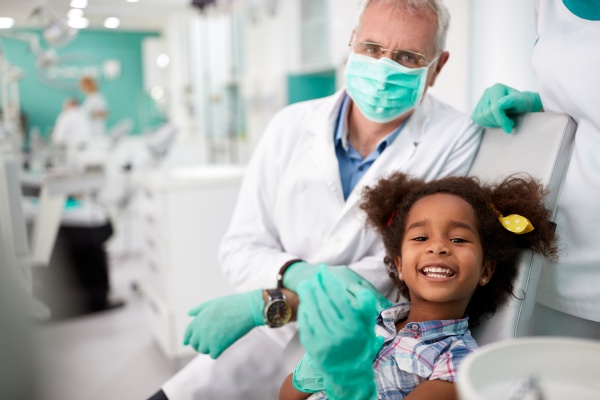5 Dental Milestones for Children

A child’s dental health is an important factor of their overall dental health as an adult. As children lose and grow new teeth, their gums expand. They also learn valuable dental health habits, another integral factor for the health of their teeth as an adult.
Dental milestones for children
These five milestones will let you know whether your kids are right on track.
1. Teething begins
Infants will begin to teethe, or grow brand new teeth, as early as three months. It is typical for the front teeth (top or bottom) to appear before canines or molars. This is in order to provide the infant with a method of breaking down food. As soon as teething begins, infants can start experimenting with solid foods. Babies can grow one or several teeth at a time. Each baby’s rate of growth will differ, and most will have a full set of teeth around age two.
2. Teething ends
Toddlers should have a full set of teeth by age three. If this is not the case, they need to see a pediatrician or dentist. This milestone is marked by having a full mouth of “baby teeth.” The last teeth to cut, or grow anew, are the molars. These are particularly painful and can cause fever, headache or even a cold. It is psychologically difficult for a toddler to understand why this pain is occuring, so they will often cry excessively when getting their back teeth.
The completed growth of baby teeth is important because it sets how their adult teeth will grow. If there are issues with the baby teeth, like overlapping or an over/under bite, be sure to see a dentist. However, it is also an important milestone for parents because it signifies the end of the teething stage!
3. Losing baby teeth
Children will start to lose their baby teeth around age six. They will continue to lose teeth and grow their adult teeth for the next few years. This is the opportune time for the tooth fairy to appear! Baby teeth can fall out naturally or sometimes because of impact. Baby teeth are still softer than adult teeth, and it is recommended for children to wear mouthguards in sports where their face may be impacted.
Adult teeth will grow in place of the lost baby teeth. This can cause some pain and discomfort, but not nearly as bad as when they were growing their baby teeth, because the gums already have space for teeth to grow.
4. Braces
Usually, all the baby teeth are lost by the time a child is at the pre-teen stage of 12. This is an excellent time to consider braces if there are any spacing issues with your child’s teeth. Since their bodies will continue to grow and develop as a young adult, braces will help “set” their teeth to be aligned and straight. Newly attained adult teeth of a pre-teen are more easily set straight by braces than when the child grows to adulthood.
5. Wisdom teeth
Wisdom teeth will grow naturally after the rest of the adult teeth, around ages 18 to 24. They often need to be removed, since they can cause pain and discomfort and are not deemed necessary by modern dentists. Wisdom teeth can tend to grow at irregular angles, which can affect the alignment of other teeth if not addressed.
Time to see the dentist
Children will reach several dental milestones associated with their development. They will get baby teeth, lose them, grow adult teeth and possibly need to have their wisdom teeth removed. No matter what the stage of their teeth or overall development, children should see a dentist for a check up at least once per year.
For more information or to schedule an appointment with Canyon Ridge Pediatric Dentistry, request an appointment in our Parker office here: http://www.canyonridgepediatricdentistry.com. Or call us at (303) 841-7900.
Related Posts
Proper dental hygiene in children is as important, if not more so, than adults. Kids' dental hygiene and health can determine many factors about their dental health in the future, such as gum health, teeth placement and oral hygiene. Without proper care, a child’s dental routine could cause issues for them later in life. One…
Curious about the importance of dental checkups for children? Read on to learn more. As parents, one of your top priorities is making sure your kids have healthy teeth and gums. Maintaining your child's oral health requires regular dental checkups. This article covers some of the reasons why you should take your child in for…
Many children experience dental anxiety before a dental checkup. However, the good news is that there are certain things parents can do to help children deal with their nerves before a visit with a kid friendly dentist. By taking the time to help your child deal with their anxiety at a young age, it can…
Why are dental checkups for kids significant? Because as soon as kids have teeth, they can get cavities. That is why consistent checkups in early childhood, in addition to good dental hygiene habits taught at home, can ensure that kids will be healthy throughout their lives.Early checkups avert tooth decay and dental pain, which might…
